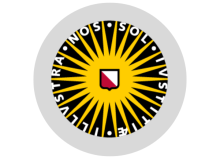Get ready for your studies
Starting a new phase in your academic career can be daunting, however, you will receive a lot of information at the start of the programme and will have support throughout. Make sure to keep an eye out on your email so you don’t miss any important information from your programme!
Here we have put together some general information and tips to help you feel ready and know where you can find information or support when needed.
1. Student website & identifiers

UU student website
When you start your academic life in Utrecht, you will find a lot of useful information such as course information, support services, events and more on our website for current students.

Digital student card
All students who are enrolled at Utrecht University receive a digital student card. You will find this in the My-UU app. It states the degree programme in which you are enrolled and the period of enrolment.

Solis-id
Your Solis-id is your user name for most university services. Used in combination with your Solis password, it gives you access to services such as OSIRIS, Blackboard and Surfspot. You should also sign in to UU computers using your Solis-id.
2. Teaching & course information

Academic calendar
The academic year at Utrecht University is divided into 2 semesters and each semester is divided into 2 blocks/periods/terms. Lectures, classes and exams take place in these periods, although some programmes may slightly differ. It is best to check your programme's timetable to see the exact dates.

Assessment & testing
Depending on the programme you are following, you can have a number of assessment and testing methods including, exams, essays/papers, presentations, thesis, class participation & more.

Credit system (ECTS)
Utrecht University uses the European Credit Transfer System (ECTS). In the Netherlands, one academic year (full time) = 60 EC = 42 weeks or 1680 study hours.

Grading system
The grading system in the Netherlands might differ significantly from the grading system you are used to. Our university uses a 10 point grading system: 1 is the lowest grade and 10 the highest. In the Netherlands, grades 1-3 and 9-10 are rarely awarded. The lowest passing grade is a 6. In a few specific programmes, Utrecht University also uses the Anglo-American letter grading system (A to D, F = Fail).

Course information
Your programme will inform you about the necessary course information before you arrive, for an overview, search for your programme on the student website. On that page, you can find your curriculum, practical information, contact details and more.
4. Support during your studies

Support during your studies
There are several different resources offered by the university to ensure you feel supported during your studies. It is important to dedicate time to your well-being and development alongside your studies.

